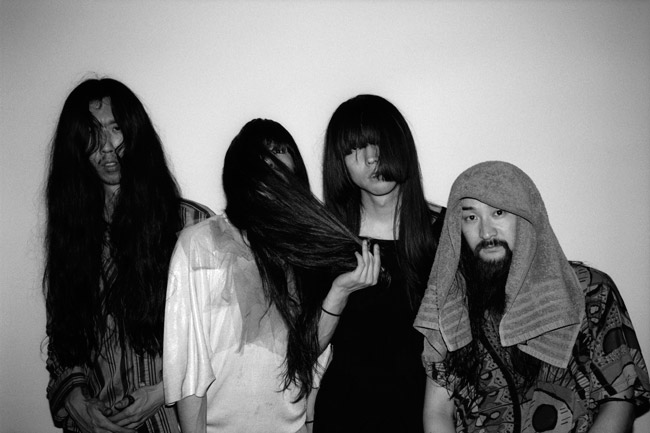 Currently residing in London by way of Tokyo, the band Bo Ningen is a psychedelic four-piece with the greatest hair and one of the most distinct looks in rock and roll. But their luscious locks are not all that these guys have going for them: The fact that a Japanese band singing in its native tongue is regularly booked at London’s best events and venues speaks volumes—volumes that have recently landed Bo Ningen its first full U.K. tour and huge interest from music fans and journalists all around the world.
Currently residing in London by way of Tokyo, the band Bo Ningen is a psychedelic four-piece with the greatest hair and one of the most distinct looks in rock and roll. But their luscious locks are not all that these guys have going for them: The fact that a Japanese band singing in its native tongue is regularly booked at London’s best events and venues speaks volumes—volumes that have recently landed Bo Ningen its first full U.K. tour and huge interest from music fans and journalists all around the world.
Interview with Taigen (Vocals/Bass)
How did Bo Ningen come about in London, of all places?
We all met in London. Kohhei (guitar) and I were in different bands, and we met at a Japanese Music Night in London. After that, my friend introduced me to Yuki (guitar). He was looking for a guitar to borrow, because he couldn’t bring his own from Japan. Then Mon-chan (drums) was introduced by our mutual friend, a Japanese dominatrix in London. I think it was a great coincidence that we all met in London, as we are all from completely different parts of Japan.
Is it tough being a Japanese band based in London?
When we started almost five years ago, we performed at mixed-genre music nights, and that was a bad thing. Some of the audiences and other bands we played with were a bit offensive to us sometimes, because we were so free-form and noisy. We don’t get that kind of feedback anymore, and now we feel that London is our home, especially when we play here after coming back from European and Japanese tours.
Are you viewed as a Japanese band, or do a lot of people see you as a British band?
In Japan, people use the phrase “reverse import” for us. Japanese audiences care much more about music genre and nationality than people in the U.K. do. They tend to stick to one kind of music. Usually, they will only listen to Japanese rock or only to U.S./U.K. rock—but never to both. So it’s quite hard to win over those listeners in Japan. But… we’ve become a Japanese band for people who’re into Japanese rock, and a U.K. band for people who listen to foreign bands.
Would “psych rock” be a fair tag for the music you make?
Yes, even though we don’t want to be categorized into one music genre. Psychedelic doesn’t have any restrictions in terms of music or even fashion. If you are categorized as metal or punk, there are so many things you can’t do, but with psychedelic, we can do whatever we want. As long as it goes through our “Bo Ningen filter,” everything we do is psychedelic.
Which current bands and musicians influence the music you make?
A Japanese idol group called Momoiro Clover Z is one of my biggest influences so far. Their performances are so intense, and I learn so many important things from them as a musician and performer. I want all musicians, especially the lazy indie guys from the U.K., to check them out. They definitely have so many elements that we, as musicians, have forgotten about.
How do your live sets compare to your recorded music?
I believe that our live show is the ultimate experience for both the audience and ourselves. You use your five, even six senses… whatever they feel becomes an “experience.” The live shows totally depend on the audiences. Performing live is kind of a purification for me sometimes. For recorded music, you only use your ears to focus on listening. It’s totally different. But I don’t mean that our live music is better than our recorded material; we believe that we can give something you can’t get from our live shows in the recorded material. We try our best to balance them.
What are the differences between your live audiences in the U.K. and in Japan?
The audiences at our Japan shows are a bit younger, and most people there look similar in terms of fashion. Our live audiences in the U.K. are a bit more mixed, both generation- and fashion-wise. British bands that tour Japan always tell us that Japanese audiences are very polite and quiet, but it depends on where and what kind of event you play. The Japanese audiences at some of our events are even crazier than the British ones. Of course in Japan, they also understand my Japanese lyrics and what exactly I’m singing about, which might affect our performances too.
Text by Mike Burns
Photography by Mads Tegler

